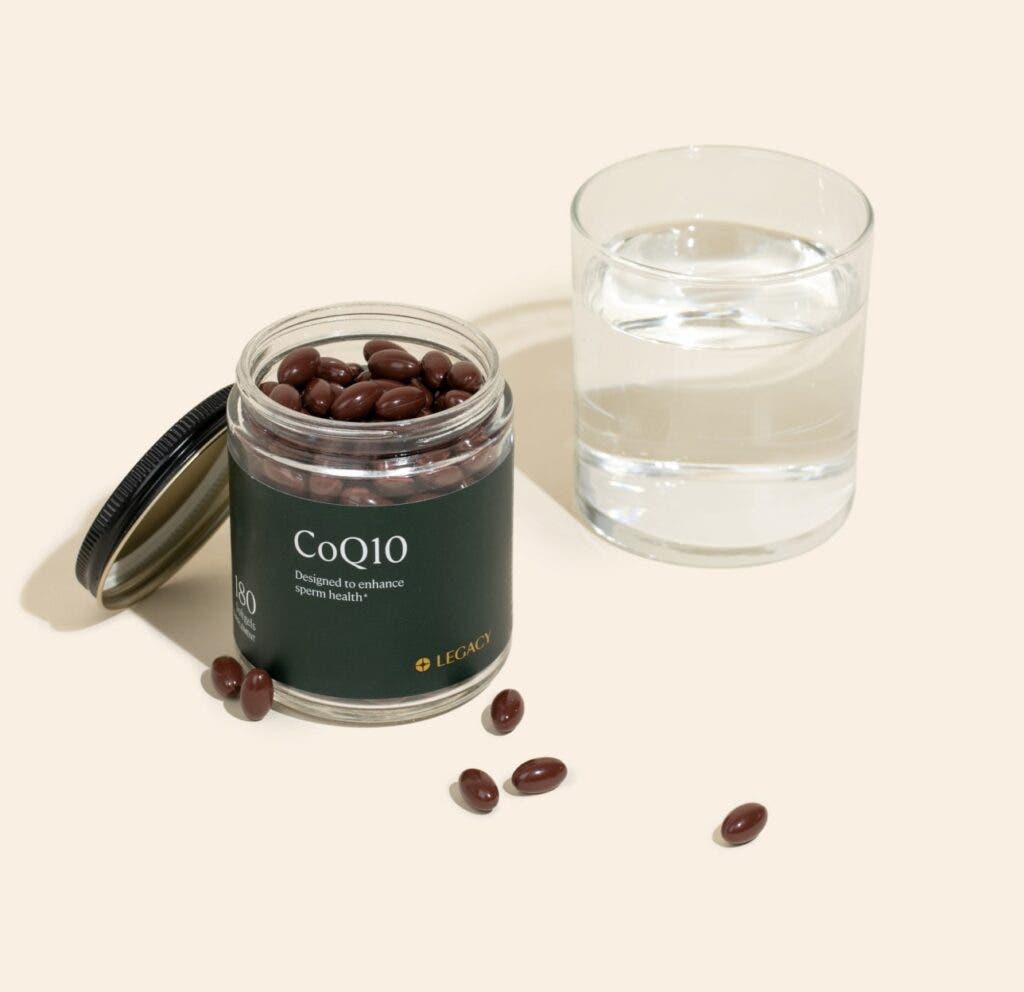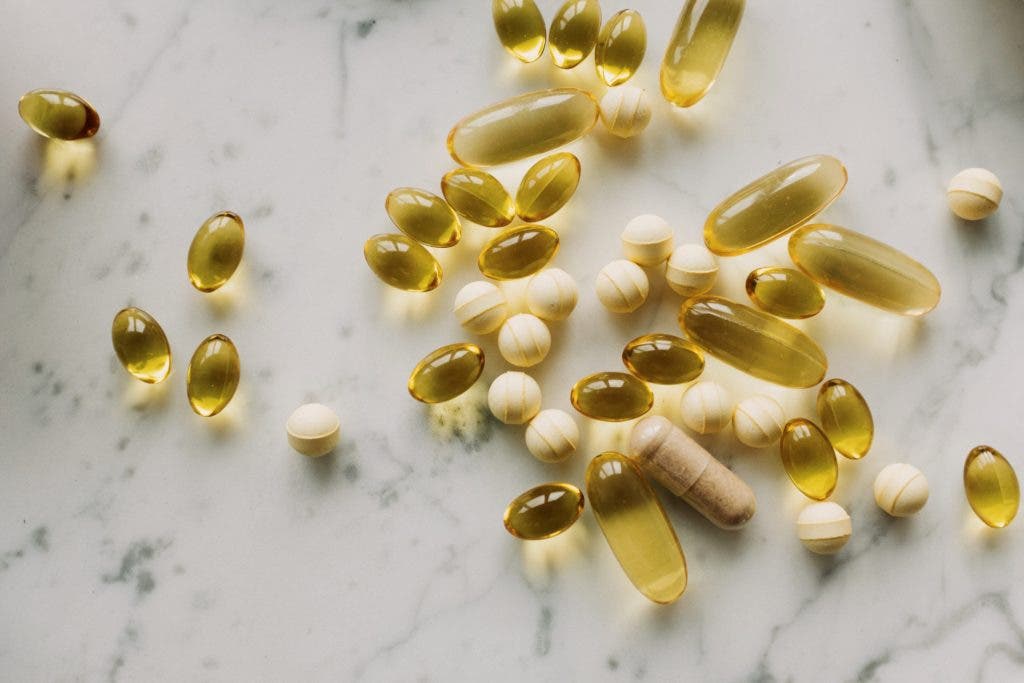Following a healthy diet, abstaining from alcohol and smoking, and even getting enough sleep are important lifestyle habits that support fertility — whether you have ovaries or testicles. The same could be said for taking fertility supplements. Although the male and female reproductive systems have different roles when it comes to trying to conceive, there are certain supplements that can benefit both partners.
From CoQ10 to vitamin D and folate, let’s explore the best fertility supplements for men and women, how they work, and when to start taking them to increase your chances of conceiving.
The following guide is written generally for cisgender, heterosexual couples. However, families come in many forms and Legacy supports them all. Learn more about LGBTQ fertility options.

CoQ10
Coenzyme Q10, also known as CoQ10, ubiquinone, and ubiquinol, is a powerful antioxidant that supports the growth and maintenance of cells. CoQ10 also plays a significant role in both male and female fertility, potentially improving semen parameters and egg quality.
Though it is produced naturally in the body, levels of CoQ10 decrease with age, making supplementation beneficial for couples trying to conceive.
How CoQ10 benefits male fertility
As an antioxidant, CoQ10 may improve male fertility by reducing oxidative stress on sperm cells. Oxidative stress is damage that occurs to cells when levels of free radicals, harmful byproducts of body metabolism, are too high. It is estimated that 30–80% of male infertility cases may be due to oxidative damage to the sperm.
In addition to improving sperm motility and morphology, which refers to the movement and shape of sperm, supplementing with CoQ10 has also been shown to increase sperm concentration (how many sperm are in the semen). Research published in International Urology and Nephrology shows that this improvement in sperm quality resulted in increased rates of pregnancy and live births.
How CoQ10 benefits female fertility
Research shows that oxidative stress may also be detrimental to the female reproductive system, damaging oocytes, or developing eggs, and impairing their fertilization capacity. Oxidative stress may also contribute to embryo fragmentation (an uneven division of cells in the embryo) and the formation of developmental abnormalities, potentially contributing to spontaneous and recurrent miscarriages.
A 2018 study shows that supplementing with CoQ10 may improve ovarian response and embryo quality in women with poor ovarian reserve (few eggs). Women who took CoQ10 before IVF treatment had an increased number of retrieved oocytes, higher fertilization rates, and higher quality embryos.
CoQ10 isn’t typically included in prenatal vitamins, so additional supplementation may be helpful, especially for older women and those with lower ovarian reserve.
Vitamin D
Sometimes referred to as the “sunshine vitamin,” vitamin D is a fat-soluble vitamin mostly acquired from sun exposure. Vitamin D acts as a steroid hormone and plays a role in helping the body absorb and retain calcium and phosphorus, which are both crucial for building bone. Vitamin D also plays a critical role in reproduction, helping to promote healthy pregnancy, better quality semen, and higher IVF success rates.
Since very few foods contain vitamin D, humans must rely primarily on the sun, or supplements, to manage their levels of this key nutrient. When exposed to the sun, our skin synthesizes cholesterol into vitamin D. But since the majority of our modern lives are spent indoors, most humans are vitamin D-deficient, making supplementation important.
How vitamin D benefits male fertility
Several studies have linked vitamin D deficiency with lower semen parameters and impaired fertility. One 2011 animal study found that vitamin D-deficient rodents had poorer sperm motility and lower sperm counts than rodents with healthy vitamin D levels. A 2016 human study supported these findings, showing a correlation between vitamin D deficiency in men and impaired sperm motility, as well as with poor hormone profiles for fertility.
Later experiments suggested that vitamin D supplementation has a positive effect on semen quality by directly affecting the way calcium moves between cells, along with the activation of molecular pathways involved in sperm motility and sperm capacitation (the sperm’s ability to fertilize an egg).
How vitamin D benefits female fertility
There is a widespread distribution of vitamin D receptors in the female reproductive tract, including the ovaries, fallopian tube, vagina, and placenta of both humans and animals, which confirms the direct role of vitamin D in these organs. Studies show that vitamin D isn’t only correlated with positive effects on female fertility; it also may impact pregnancy and lactation, making a case for supplementation before, during, and after giving birth.
In one 2018 study, researchers found that women who had healthy levels of vitamin D had more live births and more positive pregnancy tests after fertility treatment, compared to vitamin D-deficient women. In another study, vitamin D-deficiency was associated with higher miscarriage rates, while higher vitamin D levels correlated with better quality embryos.
Among women of reproductive age, experts say that more than 40 percent are insufficient in vitamin D, making supplementation highly beneficial. Prenatal vitamins typically contain at least 400IU of vitamin D.
Folate
Also known as folic acid, folate is a B vitamin that helps the body convert food into energy. Folate also helps make genetic material like DNA and RNA. Therefore, folate is essential for healthy cell division. Folate is important for reproduction in men and women, and is especially important for pregnant women, where it helps support the rapidly growing fetus.
Though folate is found in many foods, such as dark, leafy greens, beans, and fresh fruits, folate deficiency can occur in those who don’t get enough fruits and veggies, those who overcook folate-rich foods, or individuals who suffer from alcoholism, anemia, or digestive system diseases. Supplementation with folic acid or 5-MTHF (methyl folate) may improve sperm quality and lower the risk of birth defects.
How folic acid benefits male fertility
Folic acid plays an important role in spermatogenesis, or the production and development of mature sperm. Research shows that low levels of folic acid are associated with sperm DNA fragmentation, or genetic damage to the sperm which can hinder male fertility.
One study found that supplementing with high doses of folate may be beneficial for sperm health, especially when combined with zinc. Men who supplemented with folate and zinc had a significantly higher sperm concentration, as well as much higher quality sperm than those taking a placebo.
How folic acid benefits female fertility
Folate is a crucial component of female production, helping to promote oocyte quality and maturation, implantation, placentation, fetal growth, and organ development. In fact, folate is so important that the CDC recommends all women who could become pregnant to take 400 micrograms (mcg) of folic acid each day. This helps prevent birth defects like anencephaly and spina bifida, and is typically a primary ingredient in prenatal vitamins, and supplements food with folate from a well-balanced diet.
Supplementation with folic acid may be helpful even before you’re pregnant. Studies show that folic acid supplementation has been shown to increase ovulation rates as well as pregnancy rates due to an increase of progesterone levels.

Omega-3 fatty acids (DHA)
Omega-3 fatty acids are healthy fats the body needs for a broad range of cellular and bodily functions, including:
- Maintaining cardiovascular health
- Regulating inflammation
- Supporting reproductive health
- Supporting brain health for both adults and developing fetuses
Omega-3s are essential nutrients, which means the body needs them, but they must be acquired from external food sources like fish, seeds, nuts, or through supplementation because the body cannot make them on its own.
There is some evidence that omega-3 fatty acids, specifically DHA, can increase fertility in both males and females by improving semen parameters and egg quality in advanced age.
How DHA benefits male fertility
In order for round immature sperm cells to develop into “pointy-headed super swimmers,” DHA is essential, suggests this research from the University of Illinois. This omega-3 fatty acid is needed to build the acrosome, an arc-like structure at the tip of the sperm that contains the enzymes needed by sperm to penetrate an egg. Studies show that DHA may also increase sperm motility, and that higher levels of DHA in seminal plasma may have a protective effect on sperm.
In a 2011 study it took 32 weeks of omega-3 supplementation to produce a significant improvement in sperm cell total count. But in this research from 2015, improvements in sperm parameters could be seen after just four weeks of supplementation.
How DHA benefits female fertility
Omega-3s, specifically DHA, are the building blocks of the fetal brain and the retina, which is why adequate consumption of these fatty acids is vital during pregnancy. Research indicates that omega-3s consumed during pregnancy may also lead to improved neurodevelopmental outcomes in the child, including better memory and superior verbal development.
Another study showed that children born to mothers who reported no intake of seafood — a primary source of DHA — had the greatest risk of poor verbal performance, a lower IQ, behavioral problems, and poor fine motor skills. Researchers concluded that the higher the maternal seafood intake, the less likely the child was to have these suboptimal outcomes.
Supplementing with omega-3s may also improve chances of pregnancy for older women. A 2017 study suggests omega-3s may help delay ovarian aging and improve egg quality. While lifelong consumption of omega-3s is ideal, the research shows that even starting to increase your DHA intake in your 30s may help improve egg quality.
Additional supplements for male fertility
In addition to the supplements listed above, there are a number of other male fertility vitamins, minerals and herbs that support sperm production and hormone health. These include zinc, selenium, adaptogens like ashwagandha, the Indian cooking staple fenugreek, the Peruvian aphrodisiac maca root, and vitamins C and E.
L-carnitine is another important supplement that may improve male fertility. Research shows that this amino acid may improve motility and increase the activity of acrosin, an enzyme in the sperm that helps it penetrate the egg. Another study shows that men in couples undergoing IVF can benefit from taking L-carnitine for several weeks prior to the procedure to improve sperm quality and increase fertilization rates.
Learn more about male fertility supplements.
When should a couple start taking fertility supplements and prenatal vitamins?
It’s never too early to prioritize your fertility, but for those hoping to conceive in the near future, it’s ideal to start supplementing at least two to three months in advance.
Sperm takes about 74 days to produce. That means your sperm health is a reflection of your overall health for the past 2–3 months. Typically, it takes at least 12 weeks of supplementation to observe an improvement in male fertility.
For the person who will carry the baby, it’s also important to ensure that there are healthy levels of key nutrients, as the embryo will rely on a healthy body to grow and develop properly for many months. As discussed above, some vitamins and supplements can also support ovulation cycles, which take about 1–2 months to regulate.
Taking prenatal vitamins and fertility supplements in advance can help improve egg and sperm quality long before they meet — so they’re in the best shape to succeed when they do.
Supplementing is just one of many things you can do to prepare. From testing your sperm health with a semen analysis to incorporating superfoods into your diet, check out Legacy’s guide to preconception health for men and our guide for couples to improve your chances of success before you even begin.